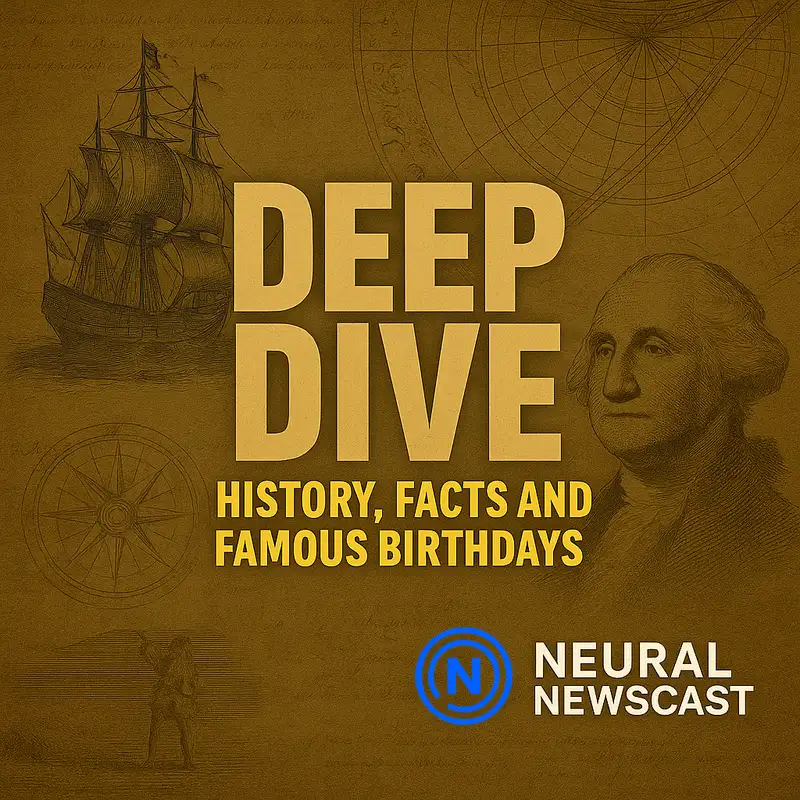Deep Dive: From Hollywood's Tragedy to Literary Legends: Marilyn Monroe and Sylvia Plath - August 5, 2025
News moves fast, but our neural networks move faster.
Analyzing, verifying, and delivering the headlines that matter.
This is Neural Newscast.
Get ready for a deep dive from Neural Newscast.
I'm Abigail, and Alexander is here with me as we delve into today's subjects.
On this day in 1962, the world woke up to the devastating news that Marilyn Monroe had passed away.
It was a moment that felt like the end of an era for Hollywood, wasn't it?
Absolutely, Abigail.
Monroe's death was more than just a personal tragedy.
It was a cultural shockwave.
Her life seemed to encapsulate the dizzying heights and perilous lows of fame.
The pressures she faced were immense.
Precisely, Alexander.
It's fascinating how her persona was both a creation of the Golden Age of Hollywood and a warning sign.
Her public image so meticulously crafted, masked the profound personal struggles underneath,
something I think still resonates with audiences today.
It does, and what's intriguing is how those conversations about the darker side of fame have only intensified over the years.
Her story prompts us to reflect critically on celebrity culture and mental health.
topics we're still grappling with.
Right.
Monroe's life almost became a narrative itself,
a tragic story interwoven with the glitz and glamour of the industry yet deeply marked by vulnerability.
It was largely perceived through the lens of the media,
and the speculation surrounding her death,
only heightened that.
True.
The immediate media frenzy after her passing underscored how Monroe's existence was so public,
yet her struggles were intensely private.
It reminds me a bit of energy sectors, oddly enough,
where public perceptions sometimes overshadow the complex realities behind the scenes.
Yes, that's an interesting parallel.
Just as Monroe's life was shaped by the forces of Hollywood's golden era,
Today's energy narratives are shaped by technological advances and policy, often hiding the intricate human stories behind them.
Exactly. And perhaps therein lies the lesson.
Understanding the full scope and humanity behind these stories is key.
Whether it's navigating fame or energy transitions, it requires a nuanced approach.
Indeed. Monroe's enduring legacy is a reminder of the profound impact of storytelling.
Her life, as tragic as it ended, continues to spark discussions about fame, media responsibility,
and ultimately, the empathy we extend to those in the limelight.
A testament to the power of narratives indeed.
Her story is a complex puzzle that we're still piecing together,
offering insights not just into the past,
but into how we might better manage the pressures of modern celebrity.
And it reminds us, Alexander, of the timeless nature of these discussions,
As we continue to celebrate Monroe's cultural influence,
it's important to remember her as a whole person, not just a Hollywood icon.
Well said, Abigail.
Understanding that full picture is crucial,
not just for honoring the past,
but for shaping a more empathetic future in all realms.
Today we celebrate the birthdays of Alfred Nobel, 1833,
Sylvia Plath, 1932, and Bill Gates, 1955.
Alfred Nobel, Sylvia Plath, and Bill Gates.
What a fascinating trio from vastly different fields.
But let's focus on Sylvia Plath for this segment, shall we?
Her work has had such an enduring impact on literature.
Absolutely, Alexander.
Sylvia Plath's contributions to literature,
particularly through her confessional poetry and her novel, The Bell Jar, are monumental.
Her writing often explores themes of self-identity and mental health, which were quite groundbreaking for her time.
Right, and her life was tragically short, yet she managed to leave such a profound mark on the literary world.
I find it intriguing how her poetry, so intimate, intense, still resonates with readers today.
It does.
Ariel, her posthumously published collection, really showcases her raw emotion and linguistic
precision.
You know, there's something so powerful about how she managed to convey her internal struggles with such clarity and bravery.
And didn't she also integrate her academic background into her writing?
I recall reading she studied at both Smith College and Noonam College, Cambridge.
It's remarkable how those experiences must have influenced her work.
Yes, exactly.
Her academic journey was significant in shaping her literary voice.
At Cambridge...
She was exposed to both the literary elite and the intense pressures of academic life,
which often found their way into her writing.
It's as if her poetry mirrored her internal and external worlds colliding.
That collision you mentioned, it's interesting how that's mirrored in her personal life too.
Her marriage to fellow poet Ted Hughes was famously turbulent, yet they influenced each other's work deeply, didn't they?
Indeed. Their relationship was complex, full of creative exchange and tension.
Hughes's editing and publishing of her work after her death
were crucial in ensuring her legacy, though not without controversy.
That's what I thought. It's a testament to how intertwined her personal and professional
lives were. Her work continues to encourage conversations around mental health
and the role of women in literature. Precisely, Alexander.
Her honesty in confronting personal demons through art has opened doors for countless other writers.
Plath's legacy isn't just her own body of work, but also the brave narratives she's inspired
in others.
Sylvia Plath's story, albeit tragic, is a powerful reminder of the enduring strength
of authenticity in writing.
Her influence is everywhere, from how we approach discussions of mental health and literature
to how we view the role of the writer in society.
Exactly.
Her work remains a beacon for readers who seek understanding and solace.
and her influence on contemporary literature is undeniable.
We'll be right back after this short break.
From breaking news to developing stories,
you're listening to NNC, Neural Newscast,
fast, factual, and thoughtfully reviewed.
Visit neuralnewscast.com for past episodes and all our shows.
Welcome back to Neural Newscast Deep Dive.
Let's continue our exploration.
Did you know that the world's oldest known your mom joke is over 3,500 years old?
It was found on an ancient Babylonian tablet dating back to 1,500 BC.
Isn't that wild?
That's incredible, Abigail.
I wonder if ancient humor had any parallels to how we use humor today.
especially in how it connects people.
Absolutely, Alexander.
Humor has always been a way to build connections and break down barriers.
Those ancient jokes might have served similar purposes in easing tensions,
or simply getting a laugh among friends, much like they do today.
It makes you think about the universality of humor, right?
Across cultures and millennia, it seems we've always had this drive to share a laugh,
perhaps as a relief from everyday stress or just for the joy of it.
Precisely. And humor often surfaces in literature and storytelling as a reflection of cultural nuances.
It's a fascinating lens through which we can understand societal norms and values of the time.
That's an interesting point. Even in today's energy sector, where you might not immediately think humor has a place,
you see it in how people craft narratives to make complex topics more relatable.
Sometimes, throwing in an unexpected joke can make a technical presentation more engaging.
Right. And I suppose some themes in literature aren't too far removed from the energy sector's challenges,
like resourcefulness or survival.
The way stories about the human condition unfold, much like how we tackle energy crises,
reveals ingenious solutions, or, sometimes, humorous mishaps.
Ha! Exactly!
And humor can often highlight those mishaps in ways that make them memorable rather than just mistakes.
That ties back to storytelling's power, doesn't it?
Whether through a joke on a Babylonian tablet or a poignant narrative in a novel, it resonates.
It's all about connection.
Yes, and thinking about connection, it's intriguing how these bits of humor were carved onto slabs meant to last thousands of years.
It's almost as if they knew it was important to preserve that part of human connection for future generations.
It's kind of poetic, isn't it?
They were preserving what it means to be human, even through something as simple as a joke.
It really does link us to the past in a tangible way.
And who knows, maybe in another thousand years someone will find our modern memes and consider them just as revealing.
That's a thought.
It just goes to show the timeless nature of humor and its ability to transcend time and
space, connecting us all.
We hope you enjoyed this deep dive.
From Abigail and all of us at Neural Newscast, I'm Alexander.
Join us next time.
From daily summaries to deep storytelling, Neural Newscast keeps you informed.
Visit NeuralNewscast.com.
For more ways to listen and explore, Neural Newscast integrates real and AI-generated voices
to facilitate efficient, high-quality news production.
Developed by human experts, our AI-generated content undergoes rigorous fact-checking and
human review before publication.
While we strive for accuracy and neutrality, AI-generated content may occasionally contain
errors.
We encourage listeners to verify crucial details from reliable sources.
For more on our AI transparency practices, visit newscast.com.

